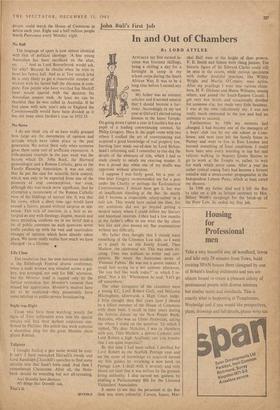John Bull's First Job
In and Out of Chambers
By LORD ATTLEE ACTUALLY my first earned in- come was fourteen shillings, being a shilling a day for a fortnight in camp in my school corps during the South African War. It was to be a long time before I earned any more.
My father was an eminent solicitor and it seemed natural that I should become a bar- rister. Accordingly in my last year at Oxford 1 started eating dinners in the inner Temple. On going down I spent a year in Lincoln's Inn as a pupil of a leading conveyancing counsel, Sir Philip Gregory. Here in the pupil room with two others I studied the art of conveyancing and acquired a good knowledge of real property law, learning later made out-of-date by Lord Birken- head's reforming zeal. 1 remember to this day the details of the abstracts of title, which I had to study closely to satisfy my exacting master. It was a proud day when one of my drafts was approved without alteration.
I suppose I was fairly good, for a year or two later Gregory recommended me for a post under the Charity or perhaps the Ecclesiastical Commissioners. I should have got it. but was of insufficient standing at the Bar. So nearly did I become a respectable salary-earner in a safe job. This would have suited me then, for my ambitions did not go beyond getting a modest salary where 1 could follow my literary and historical interests. I then had a few months in my father's office to see what the lay client was like and also passed my Bar examinations without any difficulty.
My father then thought that I should learn something of the Common Law side, so I went a pupil to an old family friend, Theo Mathew, the celebrated wit. This was more ex- citing. Theo was brilliant as writer and cari- caturist. He wrote the humorous series of 'Forensic Fables.' He was not a severe master. I recall him saying on a hot summer afternoon, 'Do you feel like work today?' to which I re- plied, 'Not a bit.' Whereupon he said, 'Let's go off somewhere.'
The other occupants of the chambers were a young KC, Lord Robert Cecil, and Malcolm Macnaghten, afterwards a High Court judge. 1 little thought then that years later I should be a fellow member of the House of Commons with them both. I recall in later years during the famous debate on the New Prayer Book, Malcolm, who was an Ulster Protestant, asking me where I stood on the question. To which I replied, 'My dear Malcolm, I was in chambers with you, Theo Mathew, a devout. Catholic, and Lord Robert a high Anglican; can you wonder that 1 am quite impartial?'
By this time I had been called. 1 devilled for Lord Robert in the Norfolk Peerage case and on the score of knowledge so acquired earned my first guiriea by reviewing a new book on Peerage Law. I dealt with it severely and only found out later that it was written by the greatest living authority. 1 also earned ten guineas by drafting a Parliamentary Bill for the Licensed Victuallers' Association.
It seems to me that the personnel at the Bar then was more colourful. Carson, Isaacs, Mar-
shal Hall were at the height of their powers. F. E. Smith and Simon were rising juniors. The historic figure of Sir Edward Clarke could still be seen in the courts, while curious specimens with rather doubtful practices, like Wildey Wright and Martin O'Connor, were active. After my pupillage I went into various cham- bers, H. F. Dickens and Hume Williams, among others, and joined the South-Eastern Circuit. I got very few briefs and occasionally devilled for someone else, but made very little headway. I was at the time ridiculously shy. 1 was not really much interested in the law and had no ambition to succeed.
Furthermore by 1906 my interests had changed. 1 had become one of the managers of a boys' club run by my old school in Lime- house, and next year left the family home in Putney and went to live in East London and learned something of local conditions. I could have been seen every morning in top hat and tailcoat walking to Stepney Green Station to go to work at the Temple or, rather, to wait for work which never came. After a year the rather cynical young Tory had become a fervent socialist and a street-corner propagandist in the Independent Labour Party, which at least cured my shyness.
In 1908 my father died and I left the Bar to take on a job as lecture secretary to Mrs. Sidney Webb's campaign for the break-up of the Poor Law. So ended my first job.






































 Previous page
Previous page